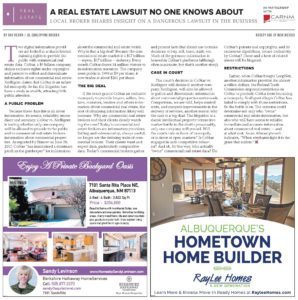

Two digital information providers are locked in a titanic lawsuit claiming rights to provide the public with commercial real estate data. CoStar, a $9 billion company, claims exclusive rights under copyrights and patents to collect and disseminate information about commercial real estate. Xcelligent claims that CoStar is an unlawful monopoly. So far, the litigation has been a study in stealth, attracting little public attention.
A Public Problem
Because these days life is all about information: its source, reliability, immediacy and accuracy. CoStar vs. Xcelligent is testing whether only one company will be allowed to provide to the public and to commercial real estate brokers information about commercial properties. As reported by Bisnow on June 28, 2017, CoStar “has maintained a dominant perch as the gatekeeper” for information about the commercial real estate world. Why is that a big deal? Because the commercial real estate market is a $17 trillion — repeat, $17 trillion — industry. Every month CoStar draws 24 million visitors to its information resources. The company went public in 1998 at $9 per share; it now trades at about $261 per share.
The Big Deal
If the court grants CoStar an exclusive monopoly to provide buyers, sellers, brokers, investors, lenders and others information about commercial real estate, the cost of obtaining information likely will increase. Why are commercial real estate brokers and their clients closely watching the case? Today’s commercial real estate brokers are information providers. Selling and salesmanship, always useful, no longer are the defining traits of commercial brokers. Their clients want and expect data, particularly comparative data. Today’s commercial brokers gather
and present facts that clients use to make decisions to buy, sell, lease, trade, etc. Much of the germane information is housed in CoStar’s platforms (although often inaccurate, but that’s another story).
Case in Court
The court’s decision in CoStar vs. Xcelligent will decide if another company, Xcelligent, will also be allowed to gather and disseminate information about commercial properties nationwide. Competition, we are told, helps control costs, and compels improvements in the delivery of services, another reason why the case is a big deal. The litigation is a classic intellectual property versus free market battle to the death: presumably, only one company will prevail. Will the courts rule in favor of monopoly, or in favor of open markets? Is CoStar engaged in anti-competitive behavior? And oh, by the way, who actually “owns” commercial real estate data? Do CoStar’s patents and copyrights, and its numerous algorithms, secure exclusivity by CoStar? These and a host of related issues will be litigated.
Restrictions
Earlier, when CoStar bought LoopNet, another information provider, for almost a billion dollars, the Federal Trade Commission imposed restrictions on CoStar to preclude CoStar from becoming a monopoly. Xcelligent alleges CoStar has failed to comply with those restrictions. So the battle is on. The outcome could determine not only who “owns” commercial real estate information, but also who will have access to reliable, immediate and accurate information about commercial real estate — and at what cost. As an African proverb indicates, “When elephants fight it is the grass that suffers.”
By: Ray Regan, Realty One of New Mexico (HomeStyle Magazine by Albuquerque Journal)
Click here to view source article.


